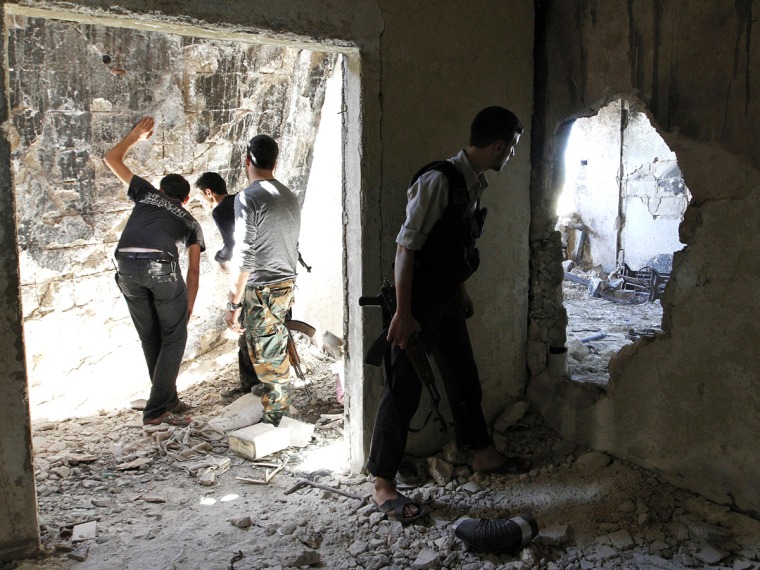Updated: 3:18 p.m.
President Obama has spent the past few weeks making a pitch for military strikes on Syria that has failed to elicit broad support, but now, after Secretary John Kerry's off-the-cuff remarks, the administration may have stumbled onto a solution.
Syria is backing a Russian proposal to turn its chemical weapons stockpiles over to international control to avoid a U.S. military strike. Obama himself called the Russian plan a potential “breakthrough,” and is said to have agreed to a U.N discussion about the proposal. The United Nations Security Council originally planned on meeting Tuesday at 4 p.m. ET to discuss the plan. The meeting, however, was cancelled after Russian authorities--who had requested it originally--withdrew their request, according to NBC News.
A year ago, Obama--apparently off-script--declared that Syrian President Bashar al-Assad’s use of chemical weapons would be a “red line” the country could not cross. He's been fighting to deal with the consequences of that verbal miscue ever since. It's forced him into a box, and the president has spent weeks struggling to make the case for U.S. military intervention in Syria to Congress and the American people—with him seeming to lose control over the issue (if he ever had it to begin with).
The latest proposal may appease Americans, Congress, and the international community--Britain, China, Germany, and others quickly praised its potential. But Obama can hardly take credit for some brilliant diplomatic masterstroke, though the administration now appears to be doing so.
The idea was floated by Secretary of State John Kerry, in another set of seemingly off-the-cuff remarks, when he was asked Monday if there was anything Assad could possibly do to prevent a barrage of military strikes. “Sure, he could turn over every single bit of his chemical weapons to the international community in the next week—turn it over, all of it without delay and allow the full and total accounting.” Kerry quickly added, “But he isn’t about to do it—and it can’t be done.”
That spurred Russian foreign minister Sergey Lavrov to get his Syrian counterpart Walid al-Moallem to agree. And now France says it will put up a U.N. resolution calling on Syria to transfer all its chemical weapons.
Kerry on Tuesday said that the U.S. was "not waiting long" for the weapons proposal, and insisted that the only reason why the idea "has any potential legs at all" is the result of U.S. pressure.
“A lot of people say that nothing focuses the mind like the prospect of a hanging," the secretary of state said while testifying in front of the House Armed Services Committee. "Well, it’s the credible threat of force that has been on the table for these last weeks that for the first time brought this regime to even acknowledge that they have a chemical weapons arsenal.”
But after scrambling Monday to disown his remark that prompted the Russian proposal--State Department spokesperson called Kerry's comments "rhetorical"--the secretary of state sought to take credit for internationally popular proposal.
"Yesterday we challenged the regime to turn them over to the secure control of the international community so that they could be destroyed," Kerry said while testifying.
Several Democrats were cautiously optimistic about the plan. House Minority Leader Nancy Pelosi said later that the proposal could prove a "victory for the president if it's real."
And Democratic Sen. Ed Markey of Massachusetts said that while he’s against the use of military force in Syria, “we should take advantage of this new diplomatic opportunity developing” as a result of the Russian proposal.
Meanwhile, Sen. Bob Casey of Pennsylvania –who is part of a bipartisan group of lawmakers drafting an alternative resolution, told MSNBC that his skepticism over the Russia proposal remains “very high.” He added Russia should “put up or shut up” but “If they can prove this, and get it done in a short timeframe, I think that changes the approach that many of us would take with regard to the need for a military strike because the threat of the ongoing use of chemical weapons would be removed.”
Any seeming victories for the U.S., may be short-lived, however.
“The proposal gives President Obama a short-term lifeline,” Republican strategist Ford O’Connell told MSNBC. “Congress and the president are breathing a sigh of relief.”
But O’Connell noted there are two big problems. Russian President Vladimir Putin is “as trustworthy as Ryan Braun” -- the disgraced Milwaukee Brewers star who repeatedly lied about using performance enhancing drugs before finally conceding the truth this summer. And any sort of Syrian disarmament would not happen overnight.
The Congressional vote may be delayed, but the question if the U.S. will have to use force in Syria “is going to be very real” in the future," he said.
Steven A. Cook, a senior fellow for Middle Eastern studies at the Council on Foreign Relations, said that while the proposed solution will “help the Obama administration climb down from the place they have put themselves, which seems very uncomfortable,” there are still practical details on how a disarmament would actually take place.
“There’s still a civil war going on. Are we going to send the U.N. in the middle of a war zone to secure these weapons?” said Cook.
He reiterated the concern that it will be hard to trust Assad and Putin. And, the proposal “lets Assad off the hook and allows him to pursue the civil war without the threat of foreign intervention.”
Putin on Tuesday said the plan to disarm will only work if the U.S. takes the possibility of military strikes completely off the table.
He told RT: "Certainly, this is all reasonable, it will function and will work out, only if the US and those who support it on this issue pledge to renounce the use of force, because it is difficult to make any country – Syria or any other country in the world – to unilaterally disarm if there is military action against it under consideration."
